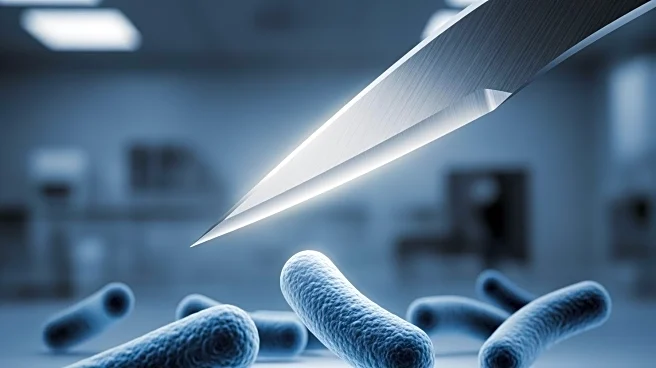What's Happening?
A recent study has unveiled significant insights into the proteome of Bdellovibrio bacteriovorus, a predatory bacterium known for its ability to invade and consume other bacteria. The research highlights the importance of proteases, enzymes that break
down proteins, in the predation cycle of B. bacteriovorus. These enzymes are crucial for the bacterium to penetrate the outer membrane and peptidoglycan of its prey, facilitating both the invasion and exit phases of predation. The study identified that approximately 10% of the B. bacteriovorus genome encodes hydrolytic enzymes, including 150 predicted protease genes. These findings underscore the role of these enzymes in the bacterium's ability to efficiently lyse prey cells and utilize their nutrients for growth and replication.
Why It's Important?
The discovery of the role of proteases in B. bacteriovorus predation has significant implications for understanding bacterial interactions and potential applications in biotechnology. By elucidating the mechanisms of bacterial predation, this research could pave the way for developing novel antibacterial strategies that harness predatory bacteria to target harmful pathogens. This approach could offer an alternative to traditional antibiotics, addressing the growing concern of antibiotic resistance. Additionally, understanding the predation cycle at a molecular level may lead to advancements in microbial ecology and the development of biocontrol methods in agriculture and environmental management.
What's Next?
Future research may focus on further characterizing the specific proteases involved in the predation cycle and their potential applications in medicine and industry. Scientists might explore genetic engineering of B. bacteriovorus to enhance its predatory efficiency or target specific bacterial pathogens. Additionally, studies could investigate the ecological impact of deploying predatory bacteria in natural environments and their interactions with microbial communities. Collaboration between microbiologists and biotechnologists could lead to innovative solutions for combating bacterial infections and improving public health.
Beyond the Headlines
The study raises ethical and ecological considerations regarding the use of predatory bacteria in various applications. While promising, the deployment of such organisms must be carefully managed to prevent unintended consequences in ecosystems. Regulatory frameworks may need to be developed to ensure safe and effective use of predatory bacteria in clinical and environmental settings. Furthermore, the research highlights the complexity of microbial interactions and the potential for discovering new biological processes that could revolutionize biotechnology.
















